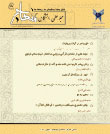فهرست مطالب

مجله منهاج
پیاپی 5 (پاییز 1386)
- تاریخ انتشار: 1390/10/15
- تعداد عناوین: 8
-
-
صفحه 5
-
صفحه 7
-
صفحه 53
-
صفحه 109
-
Page 7Discussing the category of Khalq and Amr is in fact a glance at the mode of creation of creatures through Quranic verses. When speaking of actualization of things through natural causes the holy Quran refers to the term "Khalq" and its derivations, and when referring to creation of a creature without intermediation of any natural cause and matter it uses the term "Amr". The present essay intends to expound some Quranic verses dealing with clearer instantiations of khalq and amr and to investigate some hadiths concerning amr world.Keywords: khalq (creation), amr (command), spirit, word
-
Page 21Sanaee Ghaznavi, entitled hakim (the sage), is among poets of fifth Hijri century who was a master in literature, jurisprudence,Quranic commentary, and hadith and was considered a head in philosophy and prevailing sciences of his time. Consisting of 13780 couplets, divan of Sanaee contains various styles of poetry. He was a pious, orthodox fellow in such a way that some have considered him as being a Shiite. Most of Sanaee's poems manifest transcendent sciences of the holy Quran and hadiths in the form of ethical advices. Manifestation of mysticism as well as presentation of conditions of wayfaring towards God is the characteristic of his other poems. Clarity of marvelous influence of Quranic verses and hadiths of innocent Imams upon Sanaee's poems reflects the deep penetration of them into minds and hearts of truth-seeker men of literary.Keywords: Sanaee, divan, Quranic, hadithic themes
-
Page 37In order to discuss behavior of the holy prophet towards opponents the present essay intends to expound prophet's main behavioral characteristics from Quranic perspective. Behavioral styles differ on the basis of individual's motivation and are selected in proportion to it. Kindness, patience, advise, argument, and forgiveness are among main styles chosen by the holy prophet with respect to the opponents. Status of each of them is thoroughly taken into consideration in the present essay.Keywords: Quran, hadith, the holy prophet, behavior
-
Page 53Terminologically khulud means eternity, subsistence, and durability. This term is used in the Quran with respect to subsistence and durability of people of paradise and those of hell in them respectively. Since Khulud is a simple and not a complex reality it cannot be defined as such. What can be said in this regard is that khulud is the very being of a thing with consideration of its mode of subsistence and lack of destruction. An investigation of the term in all religions indicates that khulud is of a very clear image in all religions. From an Islamic viewpoint it must be said that khulud of people of paradise and those of hell in them is proved by Quran, hadiths, consensus, and reason. Classifying Quranic verses, the present essay draws the feature of those who are subject to khulud in paradise and hell. (This essay is adopted from a M.A. thesis supervised by Dr. Abbas Hemami.)Keywords: khulud, eternity, subsistence, durability, Quran
-
Page 85Satan and wicked beings are subjects existing somehow in all religions and Sects. Based on its beliefs, any creed has presented something in this regard. For example concerning whether those beings are real or but imaginations, and the like. The present essay, however, deals merely with Satan's behavioral variety and his acting realm. (This essay is adopted from a M.A. thesis supervised by Dr. Abbas Hemami.)Keywords: Satan, purified ones, the holy Quran, the Scripture, good, evil, divine examination
-
Page 109In the Islamic World there have been sects that followed the way of excessive exaggeration and hence attributed to Imam Ali and Imams the status of divinity. The present essay is a research concerning the current of Ghuluww and its role in fabricating hadiths as well as the way it is treated by holy Imams. That current is rooted in Judaism and Christianity who, as mentioned in the Quran, believed that Ezra and Jesus were sons of God. By conversion of Jews and Christians to Islam their beliefs penetrated into Muslims and gradually made such deviations in Islam.Keywords: ghuluww (excessive exaggeration), extremists, fabrication, hadith
-
Page 125The return to the Quran is the motto of a reformative current in writing Quranic commentary in the fourteenth Hijri century. Al- Sayyid al-Qutb's Fi Dhilal al-Quran and his analytic-descriptive method in return to the Quran as well as his great emphasis upon social-spiritual reformation in Muslim societies play a remarkable role in this connection. Using that analytic-moving method, al- Sayyid al-Qutb invites Muslims to resist against the West and non- Islamic regimes. He insists not to engage the reader to literal, theological, or juristic discussions but to concentrate on the text of the Quran and to remind spiritual, social, or human aspects. The present research deals with his method in Quranic commentary.Keywords: the method in Quranic commentary, al, Sayyid al Qutb, Fi Dhilal al Quran, literal, artistic commentary

